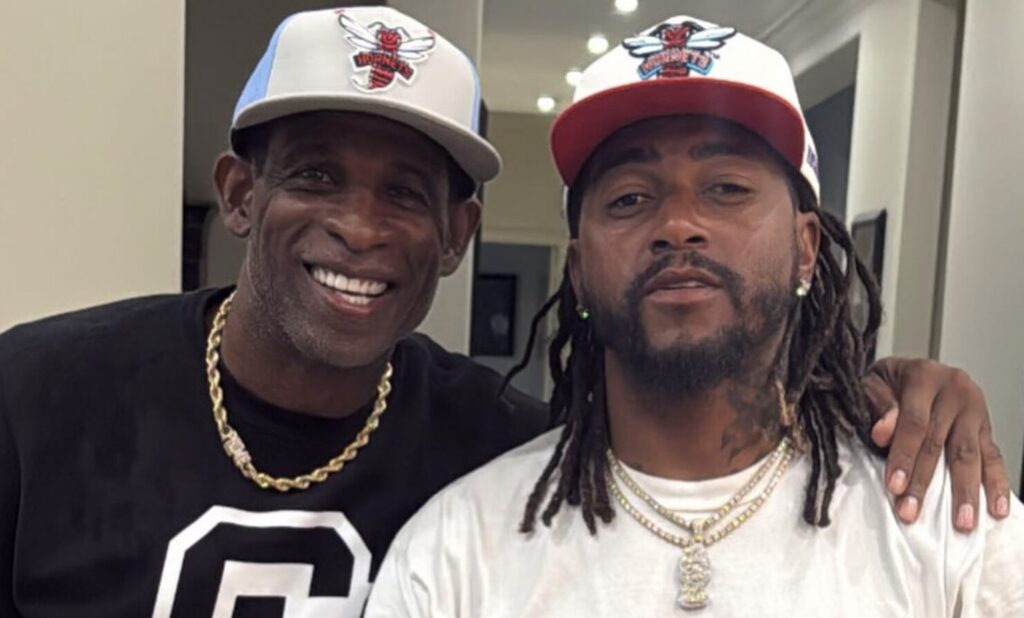
Newsletter Subscribe
Enter your email address below and subscribe to our newsletter

Colorado football coach Deion Sanders faced one of his toughest battles off the field this offseason when he was diagnosed with an aggressive form of bladder cancer. The Hall of Fame athlete and coaching star had been notably absent from team activities for months, leaving fans and media wondering about his health status. Coach Deion Sanders Bladder Cancer Battle.
Sanders underwent surgery to have his bladder completely removed and has been declared cancer-free by his medical team. The coach made this announcement during a press conference on Monday, appearing alongside his doctors to share the news with the public. He expressed deep gratitude for his recovery, saying fans had no idea how good God had been to him.
Despite this major health challenge, Sanders confirmed he is ready to return to coaching the Colorado Buffaloes for the upcoming season. He returned to campus for the first time in months and made it clear that he never doubted he would coach again. The timing of his recovery comes as Colorado prepares for their second season under his leadership after a successful 9-4 campaign in 2024.

Colorado football coach Deion Sanders revealed in July 2025 that he battled bladder cancer during the offseason, requiring surgery to remove his bladder after doctors found an aggressive cancerous tumor. Dr. Janet Kukreja confirmed Sanders is now cancer-free following the successful procedure.
Sanders received his cancer diagnosis during what was supposed to be a routine vascular checkup in spring 2025. The discovery of the bladder tumor came unexpectedly during these regular medical tests.
He left the Colorado campus in late April 2025 to begin his treatment. Sanders spent nearly three months away from the university, staying primarily at his ranch in Canton, Texas.
During his absence, Sanders remained in daily contact with his coaching staff. Colorado’s athletic director Rick George supported the coach’s time away during the critical treatment period.
Key Timeline:
Sanders had declined to discuss his health issues at earlier media appearances. He told reporters he was there to talk about his team, not his personal medical situation.
Doctors discovered an aggressive cancerous tumor on Sanders’ bladder during his medical evaluation. The tumor required immediate and extensive treatment due to its aggressive nature.
The bladder cancer diagnosis led to significant physical changes for Sanders. He lost 14 pounds during his treatment and recovery period, which he mentioned in a podcast appearance before revealing the full details.
Sanders described the cancer battle as something he had “fought and beaten.” His medical team classified the tumor as malignant, requiring complete bladder removal as the most effective treatment option.

Cancer Details:
Dr. Janet Kukreja, director of urologic oncology at UCHealth, performed Sanders’ bladder removal surgery. She is a nationally recognized expert in robotic urologic surgery.
The surgical team completely removed Sanders’ bladder as part of the treatment plan. This procedure eliminated the cancerous tumor and surrounding tissue to prevent cancer spread.
Following the surgery, doctors created a new bladder system for Sanders. Dr. Kukreja confirmed that Sanders is now cured of cancer after the successful operation.
Surgery Results:
Sanders’ son mentioned that his father didn’t leave the house for two months during recovery. The coach has since returned to Colorado and plans to continue coaching the team for the upcoming season.
Coach Sanders received care from a specialized medical team at UCHealth, led by Dr. Janet Kukreja, a nationally recognized expert in urological oncology. The team used advanced surgical techniques to remove his bladder completely after discovering a malignant tumor.
Dr. Janet Kukreja served as the lead surgeon for Sanders’ bladder cancer treatment. She holds the position of Director of Urological Oncology at UCHealth.
Dr. Kukreja brings extensive experience to complex cancer cases. She performs more than 150 bladder removal surgeries each year. This high volume of procedures makes her one of the most experienced surgeons in this field.
The doctor is a nationally recognized leader in robotic urologic surgery. This specialization was crucial for Sanders’ case. Robotic surgery offers more precision than traditional methods.
Her team focused on urological oncology, which deals with cancers of the urinary system. This includes bladder, kidney, and prostate cancers. Sanders’ case fell directly within their area of expertise.
The medical team made the decision to remove Sanders’ bladder completely. This procedure is called a radical cystectomy. They discovered a malignant tumor during his evaluation.
Dr. Kukreja and her team chose a minimally invasive approach for the surgery. This method uses smaller incisions than traditional open surgery. The robotic technique allowed for greater precision during the procedure.
The minimally invasive method helped Sanders recover faster than expected. Traditional bladder removal surgery requires longer healing times. The advanced technique reduced his recovery period significantly.
Sanders’ case required careful planning before surgery. The team had to prepare for the complete reconstruction of his urinary system. This complex procedure involves creating a new way for urine to leave the body.
Sanders faced serious health challenges during his treatment period. He lost nearly 25 pounds during his recovery process. This weight loss occurred while he focused on healing at his Texas home.
The cancer diagnosis was discovered during a checkup for previous health issues. Sanders had been dealing with ongoing medical problems before the cancer was found. These earlier health concerns led to the screening that detected his bladder cancer.
In May, Sanders’ condition became so serious that he wrote a will. He was uncertain about his survival at that time. The gravity of his situation required him to prepare for the worst possible outcome.
Sanders continued to experience recovery challenges even after successful surgery. In a video from earlier this month, he stated he was “still going through something” and “ain’t all the way recovered.” However, he emphasized that he was fighting through the ongoing healing process.
Sanders’ cancer battle forced him to miss key summer activities at Colorado, including football camps, before returning to lead the team into his third season. His absence prompted questions from media and required careful communication with his players about his health status.
Sanders missed Colorado’s annual on-campus football camps during the summer while dealing with his health issues. The coach’s absence sparked speculation about his condition before he publicly disclosed his bladder cancer diagnosis.
He returned to campus last week and posted on social media, “Back and Feeling Great!” This marked his first appearance after the extended absence that had concerned fans and media.
Sanders brought his medical team to a press conference to discuss his diagnosis openly. Dr. Janet Kukreja confirmed that Sanders had his bladder removed as part of the surgical treatment plan.
The coach plans to continue leading the Colorado Buffaloes as he enters his third season. He signed a contract extension through the 2029 season in March, showing the university’s commitment to his leadership.
Sanders held his first team meeting after returning from treatment, which was captured by his “Well Off Media” production crew. The footage showed the emotional impact of his health battle on both him and his players.
In a May 9 video clip, Sanders revealed the gravity of his situation to viewers. He said, “I don’t know if I’m ready mentally, emotionally. Last night was tough, and yesterday was tough because I had to make a will.”
The coach’s openness about his health struggles demonstrated his commitment to transparency with his team. His medical team’s presence at the press conference reinforced his dedication to clear communication about his condition.
Sanders faced questions about his health from reporters at Big 12 Media Days. He shot down one question from The Athletic, accusing the outlet of publishing “bull-junk” regarding his health status.
The coach’s defensive response showed his frustration with media speculation about his condition. His reaction highlighted the pressure he faced while managing both his health and public duties.
Colorado Athletic Director Rick George has not made public statements about Sanders’ specific health situation. The athletic department has supported Sanders through his health challenges while maintaining his coaching position.
Sanders received strong support from his family, team, and fans during his cancer battle. His son Deion Jr. stayed close by his side, while former players and the community rallied around the coach.
Deion Sanders Jr. played a key role in his father’s recovery process. The coach shared photos of himself walking with his son on his Texas property during his healing period.
His daughter Shelomi also provided emotional support during difficult family moments. She was present during Sanders’ recovery when he said he still needed time to heal.
The Sanders family stayed close together throughout the summer. They kept details private at first but remained united as Sanders focused on getting better.
Sanders spent his recovery time at his estate in east Texas. His family helped him through the weight loss and physical changes that came with his treatment.
Travis Hunter, Sanders’ star player from the previous season, maintained his connection to the coach during this time. Hunter had gotten married on May 24, an event Sanders had to miss due to his health issues.
The team showed understanding when Sanders couldn’t attend summer events. Players who visited campus in June were told their coach was out sick.
Current players and recruits supported Sanders even without knowing the full details. The team respected his privacy while he recovered in Texas.
Sanders missed important team activities including youth football camps and high school camps in June. His players waited patiently for his return to campus.
The Colorado community showed concern when Sanders missed public appearances. Fans noticed his absence from scheduled events including a speaking engagement in Florida on June 8.
Sanders used social media to reassure people he was okay without sharing details. He posted updates saying “everything is OKAY” to calm worried supporters.
Media coverage remained respectful of his privacy before the announcement. Reporters noted his absence but didn’t push for private medical information.
The athletic department handled questions professionally. They confirmed Sanders was dealing with health issues but protected his medical privacy until he was ready to share.
Bladder cancer affects thousands of people each year and requires quick treatment when tumors are found. The disease can be treated successfully with surgery, and many patients go on to live normal lives after recovery.
Bladder cancer starts when cells in the bladder grow out of control and form a tumor. The bladder is a hollow organ that stores urine before it leaves the body.
Most bladder cancers begin in the inner lining of the bladder. Some tumors stay in this lining, while others grow deeper into the bladder wall.
Common symptoms include:
Men get bladder cancer more often than women. People over 65 have the highest risk. Smoking is the biggest risk factor for developing this type of cancer.
Some bladder tumors are more aggressive than others. Aggressive cancerous tumors grow and spread faster, which means they need treatment right away.
Treatment depends on how far the cancer has spread and how aggressive the bladder tumor is. Doctors may remove just the tumor or the entire bladder.
Main treatment options include:
When the whole bladder is removed, surgeons create a new way for urine to leave the body. This might involve making a new bladder from other body parts.
Early-stage bladder cancer has high survival rates. About 96% of people with cancer that hasn’t spread live at least 5 years after treatment.
Advanced bladder cancer that has spread to other parts of the body is harder to treat. The 5-year survival rate drops to about 6% for cancer that has spread far from the bladder.
Recovery from bladder cancer surgery takes several months. Patients need time for their body to heal and adjust to changes.
People who have their bladder removed must learn new ways to manage urine. Some get a bag that collects urine outside the body. Others get a new bladder made from intestine.
Recovery typically involves:
Most people return to normal activities within 2-3 months. They can work, exercise, and travel like before their surgery.
Long-term survival is good when all cancer is removed. Patients need regular check-ups to watch for cancer coming back.
Quality of life is generally good after recovery. Many people adjust well to their new urinary system and live full, active lives.
Sanders returns to Boulder at a crucial time as the Buffaloes face major roster changes and prepare for their third season under his leadership. The team must adapt to life without key players while building on the foundation established during Sanders’ recovery.
Colorado enters the 2025 season with high expectations despite losing quarterback Shedeur Sanders and star player Travis Hunter. The Buffaloes face a challenging Big 12 schedule that will test their depth and coaching adjustments.
The team’s early games will show how well they adapted during Sanders’ absence this summer. New players must step up to fill the gaps left by departed stars.
Bowl eligibility remains a realistic goal for Colorado. The program has momentum from Sanders’ first two seasons. A strong start could put them in contention for the Alamo Bowl or similar tier bowls.
Key factors for success:
The Big 12 conference presents both challenges and opportunities. Colorado must prove they can compete without their previous star power.
Sanders brings renewed energy after overcoming his health battle. His experience facing serious illness may strengthen his connection with players and staff.
The coaching staff handled responsibilities well during his absence. This shows the program has solid leadership structure beyond just Sanders himself.
Players expressed support for their coach throughout his recovery. This loyalty could translate into stronger team performance on the field.
Sanders’ return timing aligns perfectly with fall camp preparations. He can implement his vision for the season while building on work done during his recovery.
His health scare adds perspective to his coaching approach. Sanders may focus more on long-term program building rather than just immediate results.
Fans remain excited despite uncertainty about Sanders’ health and roster changes. Season ticket sales and media attention stay high for the program.
College football observers expect Colorado to maintain competitive levels. Sanders’ recruiting ability and program visibility keep expectations reasonable but optimistic.
The team faces pressure to prove Sanders’ impact extends beyond individual star players. Success this season would validate his overall program development.
Realistic season goals:
Media coverage will focus heavily on how Sanders manages his return while rebuilding the roster. His health updates will likely continue drawing national attention throughout the season.